英语一般将来时测试卷(有答案)
英语一般将来时题20套(带答案)及解析
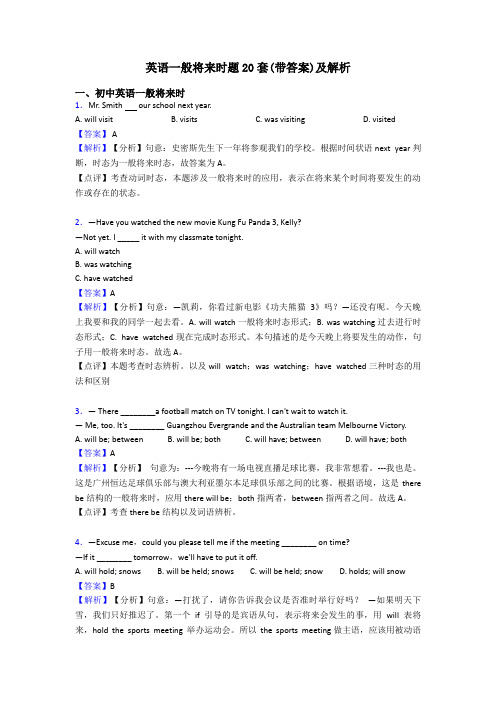
英语一般将来时题20套(带答案)及解析一、初中英语一般将来时1.Mr. Smith our school next year.A. will visitB. visitsC. was visitingD. visited【答案】 A【解析】【分析】句意:史密斯先生下一年将参观我们的学校。
根据时间状语next year判断,时态为一般将来时态,故答案为A。
【点评】考查动词时态,本题涉及一般将来时的应用,表示在将来某个时间将要发生的动作或存在的状态。
2.—Have you watched the new movie Kung Fu Panda 3, Kelly?—Not yet. I _____ it with my classmate tonight.A. will watchB. was watchingC. have watched【答案】A【解析】【分析】句意:—凯莉,你看过新电影《功夫熊猫3》吗?—还没有呢。
今天晚上我要和我的同学一起去看。
A. will watch一般将来时态形式;B. was watching过去进行时态形式;C. have watched现在完成时态形式。
本句描述的是今天晚上将要发生的动作,句子用一般将来时态。
故选A。
【点评】本题考查时态辨析。
以及will watch;was watching;have watched三种时态的用法和区别3.— There ________a football match on TV tonight. I can't wait to watch it.— Me, too. It's ________ Guangzhou Evergrande and the Australian team Melbourne Victory.A. will be; betweenB. will be; bothC. will have; betweenD. will have; both【答案】A【解析】【分析】句意为:---今晚将有一场电视直播足球比赛,我非常想看。
英语一般将来时试题(有答案和解析)含解析
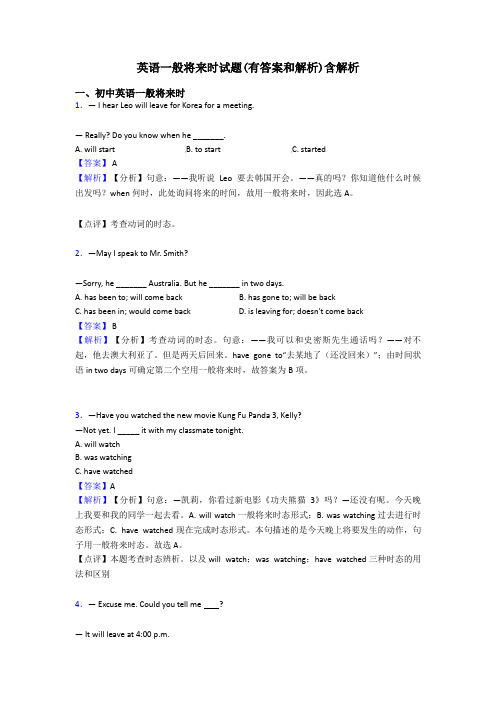
英语一般将来时试题(有答案和解析)含解析一、初中英语一般将来时1.— I hear Leo will leave for Korea for a meeting.— Really? Do you know when he _______.A. will startB. to startC. started【答案】 A【解析】【分析】句意:——我听说Leo要去韩国开会。
——真的吗?你知道他什么时候出发吗?when何时,此处询问将来的时间,故用一般将来时,因此选A。
【点评】考查动词的时态。
2.—May I speak to Mr. Smith?—Sorry, he _______ Australia. But he _______ in two days.A. has been to; will come backB. has gone to; will be backC. has been in; would come backD. is leaving for; doesn't come back【答案】 B【解析】【分析】考查动词的时态。
句意:——我可以和史密斯先生通话吗?——对不起,他去澳大利亚了。
但是两天后回来。
have gone to“去某地了(还没回来)”;由时间状语in two days可确定第二个空用一般将来时,故答案为B项。
3.—Have you watched the new movie Kung Fu Panda 3, Kelly?—Not yet. I _____ it with my classmate tonight.A. will watchB. was watchingC. have watched【答案】A【解析】【分析】句意:—凯莉,你看过新电影《功夫熊猫3》吗?—还没有呢。
今天晚上我要和我的同学一起去看。
A. will watch一般将来时态形式;B. was watching过去进行时态形式;C. have watched现在完成时态形式。
【英语】 一般将来时达标检测卷(有答案)经典
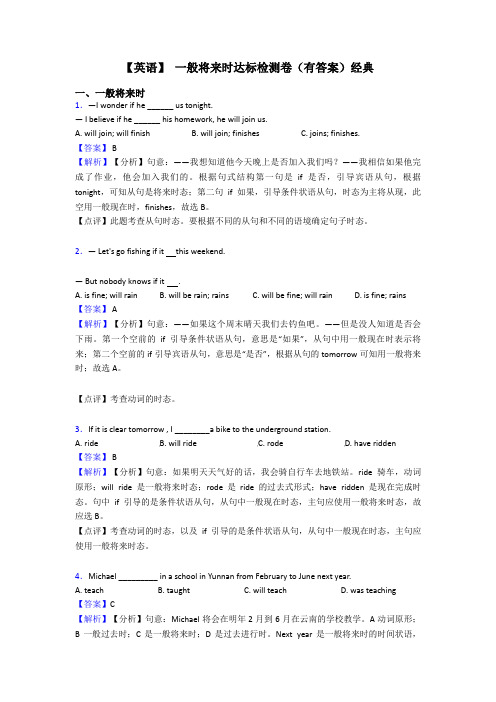
【英语】一般将来时达标检测卷(有答案)经典一、一般将来时1.—I wonder if he ______ us tonight.— I believe if he ______ his homework, he will join us.A. will join; will finishB. will join; finishesC. joins; finishes.【答案】 B【解析】【分析】句意:——我想知道他今天晚上是否加入我们吗?——我相信如果他完成了作业,他会加入我们的。
根据句式结构第一句是if是否,引导宾语从句,根据tonight,可知从句是将来时态;第二句if如果,引导条件状语从句,时态为主将从现,此空用一般现在时,finishes,故选B。
【点评】此题考查从句时态。
要根据不同的从句和不同的语境确定句子时态。
2.— Let's go fishing if it this weekend.— But nobody knows if it .A. is fine; will rainB. will be rain; rainsC. will be fine; will rainD. is fine; rains 【答案】 A【解析】【分析】句意:——如果这个周末晴天我们去钓鱼吧。
——但是没人知道是否会下雨。
第一个空前的if引导条件状语从句,意思是“如果”,从句中用一般现在时表示将来;第二个空前的if引导宾语从句,意思是“是否”,根据从句的tomorrow可知用一般将来时;故选A。
【点评】考查动词的时态。
3.If it is clear tomorrow , I ________a bike to the underground station.A. rideB. will rideC. rodeD. have ridden【答案】 B【解析】【分析】句意:如果明天天气好的话,我会骑自行车去地铁站。
英语一般将来时题20套(带答案)含解析
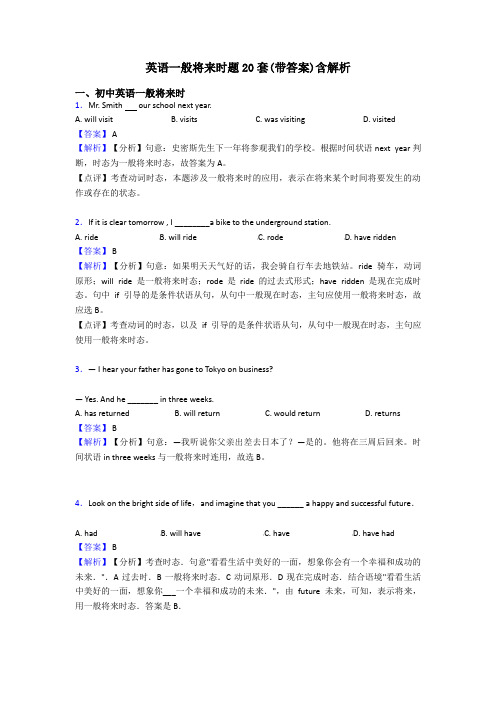
英语一般将来时题20套(带答案)含解析一、初中英语一般将来时1.Mr. Smith our school next year.A. will visitB. visitsC. was visitingD. visited【答案】 A【解析】【分析】句意:史密斯先生下一年将参观我们的学校。
根据时间状语next year判断,时态为一般将来时态,故答案为A。
【点评】考查动词时态,本题涉及一般将来时的应用,表示在将来某个时间将要发生的动作或存在的状态。
2.If it is clear tomorrow , I ________a bike to the underground station.A. rideB. will rideC. rodeD. have ridden【答案】 B【解析】【分析】句意:如果明天天气好的话,我会骑自行车去地铁站。
ride骑车,动词原形;will ride是一般将来时态;rode是ride的过去式形式;have ridden是现在完成时态。
句中if引导的是条件状语从句,从句中一般现在时态,主句应使用一般将来时态,故应选B。
【点评】考查动词的时态,以及if引导的是条件状语从句,从句中一般现在时态,主句应使用一般将来时态。
3.— I hear your father has gone to Tokyo on business?— Yes. And he _______ in three weeks.A. has returnedB. will returnC. would returnD. returns【答案】 B【解析】【分析】句意:—我听说你父亲出差去日本了?—是的。
他将在三周后回来。
时间状语in three weeks与一般将来时连用,故选B。
4.Look on the bright side of life,and imagine that you ______ a happy and successful future.A. hadB. will haveC. haveD. have had【答案】 B【解析】【分析】考查时态.句意"看看生活中美好的一面,想象你会有一个幸福和成功的未来.".A过去时.B一般将来时态.C动词原形.D现在完成时态.结合语境"看看生活中美好的一面,想象你___一个幸福和成功的未来.",由future未来,可知,表示将来,用一般将来时态.答案是B.5.—Excuse me,could you please tell me if the meeting ________ on time?—If it ________ tomorrow,we'll have to put it off.A. will hold; snowsB. will be held; snowsC. will be held; snowD. holds; will snow 【答案】B【解析】【分析】句意:—打扰了,请你告诉我会议是否准时举行好吗?—如果明天下雪,我们只好推迟了。
【英语】 一般将来时测试题及答案

【英语】一般将来时测试题及答案一、一般将来时1.I wonder when they ________ for Beijing. I will go to the train station to see them off when they ________.A. will leave; leaveB. leave; will leaveC. go; leaveD. will go; leave【答案】 A【解析】【分析】句意:我想知道他们什么时候去北京。
当他们离开的时候,我将去车站送他们。
leave for,动身前往,去……。
第一句话是宾语从句,因此从句可以使用一般将来时,第二句是when引导的时间状语从句,应遵循主将从现的原则,因此应使用一般现在时,故答案是A。
【点评】考查动词辨析和时间状语从句中的主将从现原则。
注意识记固定搭配leave for,同时只要记住在时间状语从句中的主将从现原则。
2.I’m so lucky because I see more cartoon characters next month.A. is able toB. will be able toC. be able toD. was able to【答案】B【解析】【分析】句意:我真幸运因为我下个月能看到更多的卡通人物。
next month表将来,因此用will be able to。
故选B。
【点评】考查一般将来时。
3.—Have you watched the new movie Kung Fu Panda 3, Kelly?—Not yet. I _____ it with my classmate tonight.A. will watchB. was watchingC. have watched【答案】A【解析】【分析】句意:—凯莉,你看过新电影《功夫熊猫3》吗?—还没有呢。
今天晚上我要和我的同学一起去看。
(英语) 英语一般将来时试题(有答案和解析)含解析

(英语)英语一般将来时试题(有答案和解析)含解析一、初中英语一般将来时1.Jack ______ a good rest as soon as he finishes the exam.A. hasB. hadC. is havingD. will have【答案】 D【解析】【分析】句意:Jack一完成他的考试就要好好的休息一下。
has第三人称单数形式;had是have的过去式;is having现在进行时态;will have一般将来时态。
have a rest是固定短语,意思是“休息一下”,句中的as soon as引导的是时间状语从句,从句中用一般现在时态,主句用一般将来时态,故答案选D。
【点评】考查一般将来时态。
2.— I hear your father has gone to Tokyo on business?— Yes. And he _______ in three weeks.A. has returnedB. will returnC. would returnD. returns【答案】 B【解析】【分析】句意:—我听说你父亲出差去日本了?—是的。
他将在三周后回来。
时间状语in three weeks与一般将来时连用,故选B。
3.I don't know whether mom _________ me to Beijing next week.A. takeB. takesC. will takeD. would take【答案】 C【解析】【分析】句意:我不知道妈妈下周是否会带我去北京。
分析句子结构可知,此处是宾语从句,主句时态为一般现在时,从句时态根据主现从任原则,再根据从句中的next week可知,从句应该是表示将来的动作,所以用一般将来时,用will do形式,故选C。
【点评】考查宾语从句时态。
注意宾语从句时态的主现从任原则。
4.If you want to visit the Palace Museum, I ________ tickets for you tomorrow.A. will bookB. bookedC. have bookedD. was booking【答案】 A【解析】【分析】句意:如果你想参观故宫博物馆,我明天给你订票。
高考英语一般将来时题20套(带答案)

高考英语一般将来时题20套(带答案)一、单项选择一般将来时1.We are confident that the environment ______ by our further efforts to reduce pollution. A.had been improved B.will be improvedC.is improved D.was improved【答案】B【解析】试题分析:考查时态。
根据“我们相信”说明时间将来发生,所以用将来被动。
【名师点睛】这题考查的是不同时态的被动语态。
关键是确定时态。
要抓住句子的上下文含义和句中的时间状语。
这句话没有明确的时间状语。
这时要根据上下文的语境选择合适的时态,对句意的理解就很关键了。
2.— What do you want for breakfast, Joe?— I think I _______ some bread and milk.A.will have B.am going to have C.had D.am having【答案】A【解析】试题分析:句意:--早饭你准备吃什么?--我想我想吃些面包和牛奶。
因为是将要吃..用一般将来时,排除C,ABD都可以表示一般将来时,will是临时决定,be going to do是计划,打算,be doing是即将,马上做…,所以选A。
考点:考查时态3.Only by practising a few hours every day ________ be able to play the piano well.A.you would B.would you C.you will D.will you【答案】D【解析】试题分析:考查倒装句和时态:句意:只有你每天练习几个小时,你才能把钢琴弹好。
Only+副词/介词短语/状语从句+主句(主句用部分倒装),而且这句话的时间是every day,所以用一般现在时will,选D。
【英语】英语一般将来时题20套(带答案)含解析
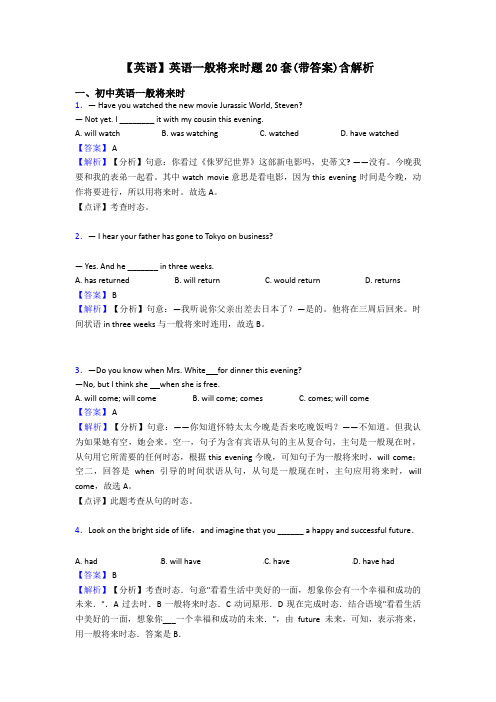
【英语】英语一般将来时题20套(带答案)含解析一、初中英语一般将来时1.— Have you watched the new movie Jurassic World, Steven?— Not yet. I ________ it with my cousin this evening.A. will watchB. was watchingC. watchedD. have watched【答案】 A【解析】【分析】句意:你看过《侏罗纪世界》这部新电影吗,史蒂文? ——没有。
今晚我要和我的表弟一起看。
其中watch movie意思是看电影,因为this evening 时间是今晚,动作将要进行,所以用将来时。
故选A。
【点评】考查时态。
2.— I hear your father has gone to Tokyo on business?— Yes. And he _______ in three weeks.A. has returnedB. will returnC. would returnD. returns【答案】 B【解析】【分析】句意:—我听说你父亲出差去日本了?—是的。
他将在三周后回来。
时间状语in three weeks与一般将来时连用,故选B。
3.—Do you know when Mrs. White for dinner this evening?—No, but I think she when she is free.A. will come; will comeB. will come; comesC. comes; will come【答案】 A【解析】【分析】句意:——你知道怀特太太今晚是否来吃晚饭吗?——不知道。
但我认为如果她有空,她会来。
空一,句子为含有宾语从句的主从复合句,主句是一般现在时,从句用它所需要的任何时态,根据this evening今晚,可知句子为一般将来时,will come;空二,回答是when引导的时间状语从句,从句是一般现在时,主句应用将来时,will come,故选A。
(完整word版)一般将来时练习题(含答案)
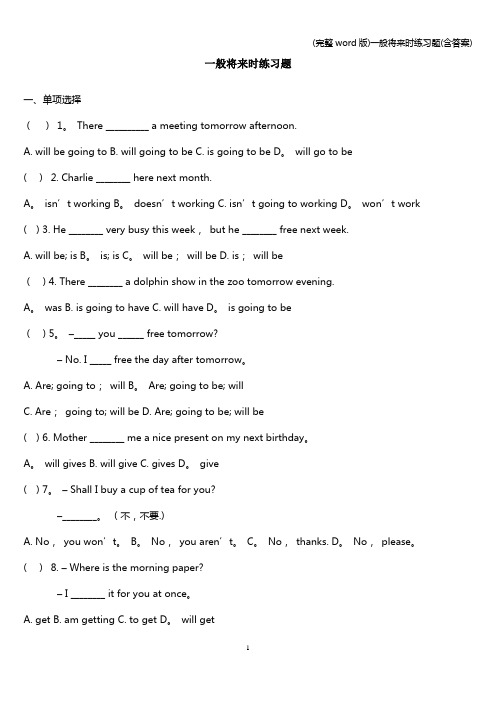
一般将来时练习题一、单项选择()1。
There __________ a meeting tomorrow afternoon.A. will be going toB. will going to beC. is going to be D。
will go to be( )2. Charlie ________ here next month.A。
isn’t working B。
doesn’t working C. isn’t going to working D。
won’t work ( ) 3. He ________ very busy this week,but he ________ free next week.A. will be; is B。
is; is C。
will be;will be D. is;will be() 4. There ________ a dolphin show in the zoo tomorrow evening.A。
was B. is going to have C. will have D。
is going to be() 5。
–_____ you ______ free tomorrow?– No. I _____ free the day after tomorrow。
A. Are; going to;will B。
Are; going to be; willC. Are;going to; will beD. Are; going to be; will be( ) 6. Mother ________ me a nice present on my next birthday。
A。
will gives B. will give C. gives D。
give( ) 7。
– Shall I buy a cup of tea for you?–________。
英语一般将来时题20套(带答案)
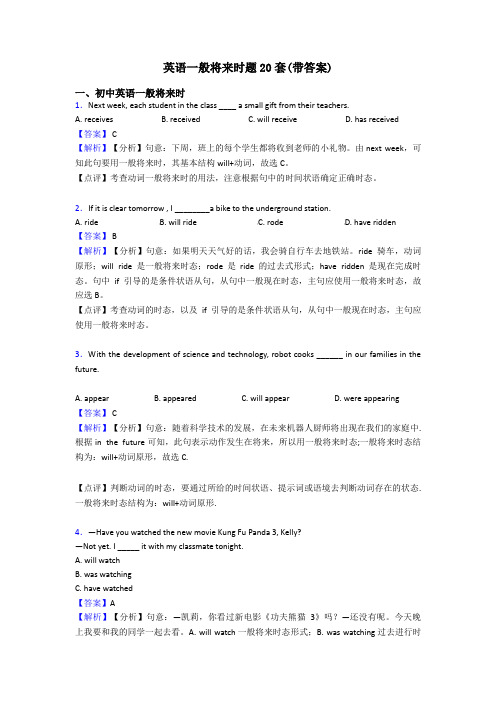
英语一般将来时题20套(带答案)一、初中英语一般将来时1.Next week, each student in the class ____ a small gift from their teachers.A. receivesB. receivedC. will receiveD. has received【答案】 C【解析】【分析】句意:下周,班上的每个学生都将收到老师的小礼物。
由next week,可知此句要用一般将来时,其基本结构will+动词,故选C。
【点评】考查动词一般将来时的用法,注意根据句中的时间状语确定正确时态。
2.If it is clear tomorrow , I ________a bike to the underground station.A. rideB. will rideC. rodeD. have ridden【答案】 B【解析】【分析】句意:如果明天天气好的话,我会骑自行车去地铁站。
ride骑车,动词原形;will ride是一般将来时态;rode是ride的过去式形式;have ridden是现在完成时态。
句中if引导的是条件状语从句,从句中一般现在时态,主句应使用一般将来时态,故应选B。
【点评】考查动词的时态,以及if引导的是条件状语从句,从句中一般现在时态,主句应使用一般将来时态。
3.With the development of science and technology, robot cooks ______ in our families in the future.A. appearB. appearedC. will appearD. were appearing【答案】 C【解析】【分析】句意:随着科学技术的发展,在未来机器人厨师将出现在我们的家庭中. 根据in the future可知,此句表示动作发生在将来,所以用一般将来时态;一般将来时态结构为:will+动词原形,故选C.【点评】判断动词的时态,要通过所给的时间状语、提示词或语境去判断动词存在的状态. 一般将来时态结构为:will+动词原形.4.—Have you watched the new movie Kung Fu Panda 3, Kelly?—Not yet. I _____ it with my classmate tonight.A. will watchB. was watchingC. have watched【答案】A【解析】【分析】句意:—凯莉,你看过新电影《功夫熊猫3》吗?—还没有呢。
【英语】英语一般将来时题20套(带答案)
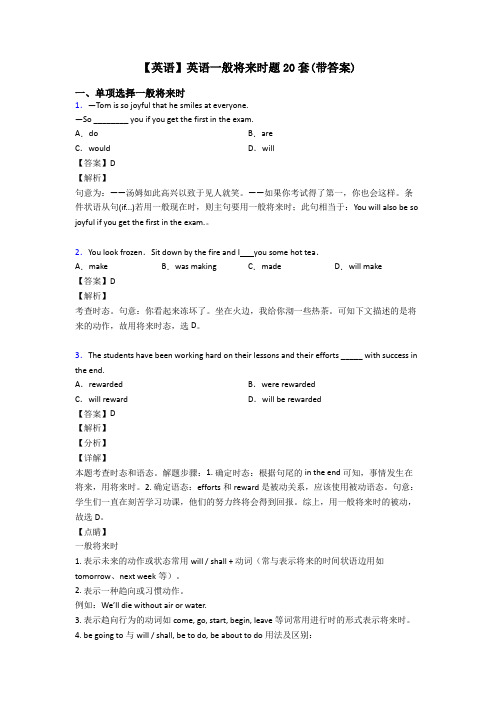
【答案】B
【解析】
考查时态。句意“将要被建的北京至上海的铁路,时速达350Km/时,将把两地的旅途用时从12小时缩短到5小时。”根据to be built可知,铁路是将要建设,故用将来时。故选B。
11.—Mike was rushed to hospital last night.Is he all right?
4. be going to与will / shall, be to do, be about to do用法及区别:
(1)shall / will do表示未事先考虑过,即说话时临时作出的决定。
(2)be going to表示现在打算在最近或将来要做某事,这种打算往往经过事先考虑,甚至已做了某种准备;be going to表将来,不能用在条件状语从句的主句中;而will do则能,表意愿。
A.will comeB.comesC.has comeD.would come
【答案】A
【解析】
试题分析:考查动词时态。句意:给他提姆买个手机怎么样?毕竟他不再是个孩子了。我认为是必要的,因为我们有时会想确认他是否会回来吃饭。根据句意这是一个宾语从句,确认他是否将回来吃饭,是一般将来时,A. will come一般将来时B. comes一般现在时C. has come现在完成时D. would come过去将来时,所以A正确。
【答案】C
【解析】
C考查时态。答语意为“别担心,我帮你去取。等一下。”此处will用于一般将来时,表示“将要做临时决定的事情”。
14.Only after one has become a parent _____ how great his parents are.
一般将来时练习题(含答案)
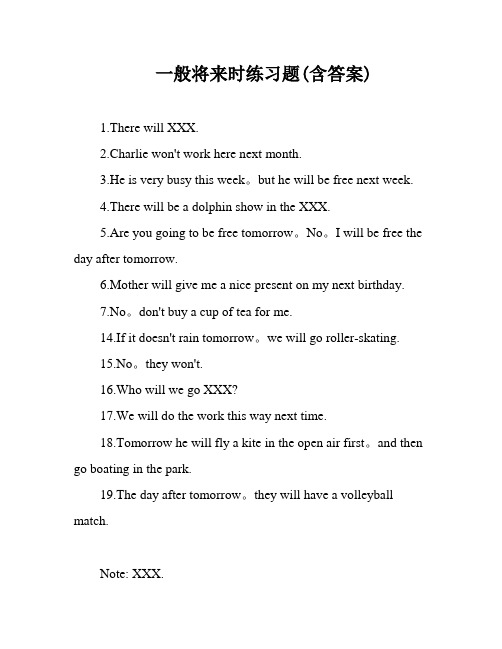
一般将来时练习题(含答案)1.There will XXX.2.Charlie won't work here next month.3.He is very busy this week。
but he will be free next week.4.There will be a dolphin show in the XXX.5.Are you going to be free tomorrow。
No。
I will be free the day after tomorrow.6.Mother will give me a nice present on my next birthday.7.No。
don't buy a cup of tea for me.14.If it doesn't rain tomorrow。
we will go roller-skating.15.No。
they won't.16.Who will we go XXX?17.We will do the work this way next time.18.Tomorrow he will fly a kite in the open air first。
and then go boating in the park.19.The day after tomorrow。
they will have a volleyball match.Note: XXX.20.There will be a birthday party this Sunday.21.They are going to have an English XXX.22.Will you be free next Sunday?23.He will be there at ten XXX.24.Is your XXX?25.Yes。
(英语)英语一般将来时题20套(带答案)含解析
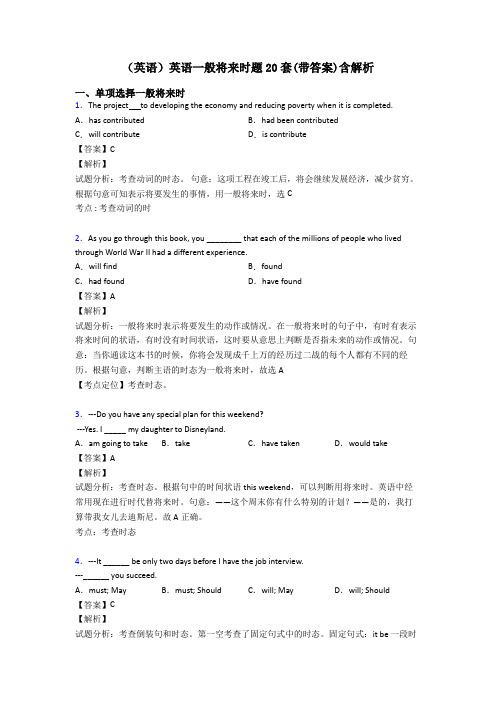
(英语)英语一般将来时题20套(带答案)含解析一、单项选择一般将来时1.The project to developing the economy and reducing poverty when it is completed. A.has contributed B.had been contributedC.will contribute D.is contribute【答案】C【解析】试题分析:考查动词的时态。
句意:这项工程在竣工后,将会继续发展经济,减少贫穷。
根据句意可知表示将要发生的事情,用一般将来时,选C考点 : 考查动词的时2.As you go through this book, you ________ that each of the millions of people who lived through World War II had a different experience.A.will find B.foundC.had found D.have found【答案】A【解析】试题分析:一般将来时表示将要发生的动作或情况。
在一般将来时的句子中,有时有表示将来时间的状语,有时没有时间状语,这时要从意思上判断是否指未来的动作或情况。
句意:当你通读这本书的时候,你将会发现成千上万的经历过二战的每个人都有不同的经历。
根据句意,判断主语的时态为一般将来时,故选A【考点定位】考查时态。
3.---Do you have any special plan for this weekend?---Yes. I _____ my daughter to Disneyland.A.am going to take B.take C.have taken D.would take【答案】A【解析】试题分析:考查时态。
根据句中的时间状语this weekend,可以判断用将来时。
英语中经常用现在进行时代替将来时。
(英语)英语一般将来时试题(有答案和解析)含解析

(英语)英语一般将来时试题(有答案和解析)含解析一、初中英语一般将来时1.— I hear Leo will leave for Korea for a meeting.— Really? Do you know when he _______.A. will startB. to startC. started【答案】 A【解析】【分析】句意:——我听说Leo要去韩国开会。
——真的吗?你知道他什么时候出发吗?when何时,此处询问将来的时间,故用一般将来时,因此选A。
【点评】考查动词的时态。
2.I don't know whether mom _________ me to Beijing next week.A. takeB. takesC. will takeD. would take 【答案】 C【解析】【分析】句意:我不知道妈妈下周是否会带我去北京。
分析句子结构可知,此处是宾语从句,主句时态为一般现在时,从句时态根据主现从任原则,再根据从句中的next week可知,从句应该是表示将来的动作,所以用一般将来时,用will do形式,故选C。
【点评】考查宾语从句时态。
注意宾语从句时态的主现从任原则。
3.I’m so lucky because Isee more cartoon characters next month.A. is able toB. will be able toC. be able toD. was able to【答案】B【解析】【分析】句意:我真幸运因为我下个月能看到更多的卡通人物。
next month表将来,因此用will be able to。
故选B。
【点评】考查一般将来时。
4.— There ________a football match on TV tonight. I can't wait to watch it.— Me, too. It's ________ Guangzhou Evergrande and the Australian team Melbourne Victory.A. will be; betweenB. will be; bothC. will have; betweenD. will have; both【答案】A【解析】【分析】句意为:---今晚将有一场电视直播足球比赛,我非常想看。
一般将来时练习(含答案)
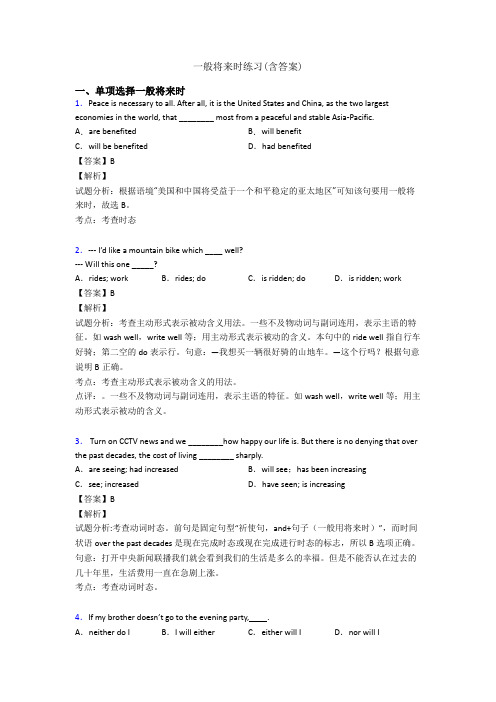
C.comes, will comeD.will come, comes
【答案】D
【解析】
试题分析:考查时态:第一个when引导的主语从句,用将来时,第二个when引导的时间状语从句,用一般现在时代替一般将来时,句意:他什么时候来还不知道。但当他回来时,他会收到热烈的欢迎。选D。
试题分析:考查情态动词。句意是:你告诉Rose关于考试的事了吗?--哦,我忘了,我现在就打电话给她。这里用will表示临时决定,故选A项。
考点:考查情态动词
14.“When he _____ is not known yet.” “But when he ____, he will be warmly welcomed.”
考点:考查时态
18.---I don’t know when _____ tomorrow.
---I will call you as soon as he_____.
A.will he come; arrivesB.he will come; arrives
C.he will come; will arriveD.will he come; will come
考点:考查时态
13.— Did you tell Mother you have passed the exam?
— Oh, I forgot. I _______ her now.
A.will callB.will be calling
C.am callingD.am to call
【答案】A
【解析】
--- Certainly. I ________ him about something else in any case. So it _______ any bother.
高中英语一般将来时经典习题(含答案)
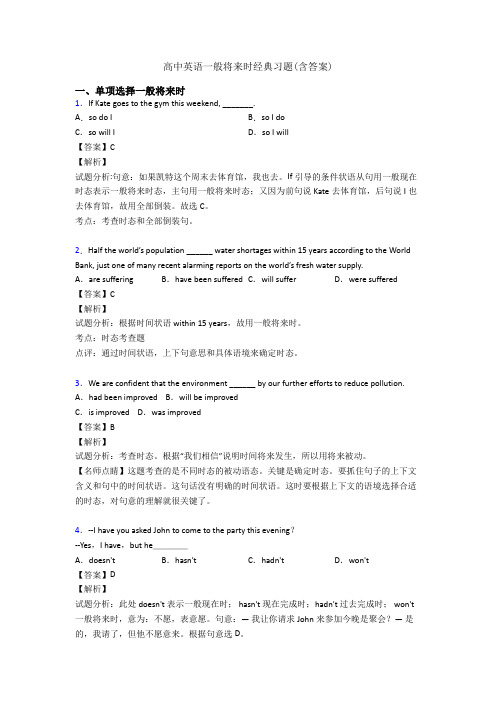
高中英语一般将来时经典习题(含答案)一、单项选择一般将来时1.If Kate goes to the gym this weekend, _______.A.so do I B.so I doC.so will I D.so I will【答案】C【解析】试题分析:句意:如果凯特这个周末去体育馆,我也去。
If引导的条件状语从句用一般现在时态表示一般将来时态,主句用一般将来时态;又因为前句说Kate去体育馆,后句说I也去体育馆,故用全部倒装。
故选C。
考点:考查时态和全部倒装句。
2.Hal f the world’s population ______ water shortages within 15 years according to the World Bank, just one of many recent alarming reports on the world’s fresh water supply.A.are suffering B.have been suffered C.will suffer D.were suffered【答案】C【解析】试题分析:根据时间状语within 15 years,故用一般将来时。
考点:时态考查题点评:通过时间状语,上下句意思和具体语境来确定时态。
3.We are confident that the environment ______ by our further efforts to reduce pollution. A.had been improved B.will be improvedC.is improved D.was improved【答案】B【解析】试题分析:考查时态。
根据“我们相信”说明时间将来发生,所以用将来被动。
【名师点睛】这题考查的是不同时态的被动语态。
关键是确定时态。
要抓住句子的上下文含义和句中的时间状语。
这句话没有明确的时间状语。
英语一般将来时题20套(带答案)
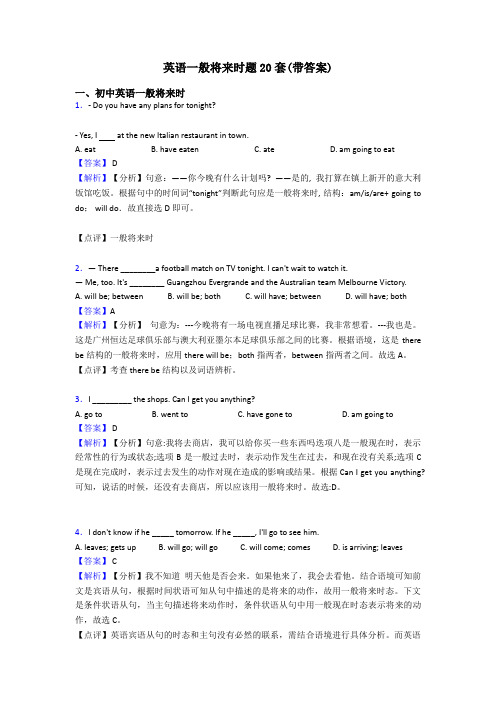
英语一般将来时题20套(带答案)一、初中英语一般将来时1.- Do you have any plans for tonight?- Yes, I at the new Italian restaurant in town.A. eatB. have eatenC. ateD. am going to eat【答案】 D【解析】【分析】句意:——你今晚有什么计划吗? ——是的, 我打算在镇上新开的意大利饭馆吃饭。
根据句中的时间词“tonight”判断此句应是一般将来时, 结构:am/is/are+ going to do; will do.故直接选D即可。
【点评】一般将来时2.— There ________a football match on TV tonight. I can't wait to watch it.— Me, too. It's ________ Guangzhou Evergrande and the Australian team Melbourne Victory.A. will be; betweenB. will be; bothC. will have; betweenD. will have; both【答案】A【解析】【分析】句意为:---今晚将有一场电视直播足球比赛,我非常想看。
---我也是。
这是广州恒达足球俱乐部与澳大利亚墨尔本足球俱乐部之间的比赛。
根据语境,这是there be结构的一般将来时,应用there will be;both指两者,between指两者之间。
故选A。
【点评】考查there be结构以及词语辨析。
3.I _________ the shops. Can I get you anything?A. go toB. went toC. have gone toD. am going to【答案】 D【解析】【分析】句意:我将去商店,我可以给你买一些东西吗迭项八是一般现在时,表示经常性的行为或状态;选项B是一般过去时,表示动作发生在过去,和现在没有关系;选项C 是现在完成时,表示过去发生的动作对现在造成的影响或结果。
英语一般将来时题20套(带答案)

英语一般将来时题20套(带答案)一、单项选择一般将来时1.(东北三校一模)I am certain by no means ________ his word since he has promised an amount of money to the poor.A.he will break B.will he breakC.broke D.did he break【答案】B【解析】B句意:我确信既然他答应捐一笔钱给穷人,他绝不会食言的。
by no means(绝不)为表示否定意义的介词短语,置于句首时,其后面的主谓语要倒装,根据句意可知设空处需用一般将来时,故答案为B项。
2.The students have been working hard on their lessons and their efforts _____ with success in the end.A.rewarded B.were rewardedC.will reward D.will be rewarded【答案】D【解析】【分析】【详解】本题考查时态和语态。
解题步骤:1. 确定时态:根据句尾的in the end可知,事情发生在将来,用将来时。
2. 确定语态:efforts和reward是被动关系,应该使用被动语态。
句意:学生们一直在刻苦学习功课,他们的努力终将会得到回报。
综上,用一般将来时的被动,故选D。
【点睛】一般将来时1. 表示未来的动作或状态常用will / shall + 动词(常与表示将来的时间状语边用如tomorrow、next week等)。
2. 表示一种趋向或习惯动作。
例如:We’ll die without air or water.3. 表示趋向行为的动词如come, go, start, begin, leave等词常用进行时的形式表示将来时。
4. be going to与will / shall, be to do, be about to do用法及区别:(1)shall / will do表示未事先考虑过,即说话时临时作出的决定。
英语一般将来时专项训练100(附答案)
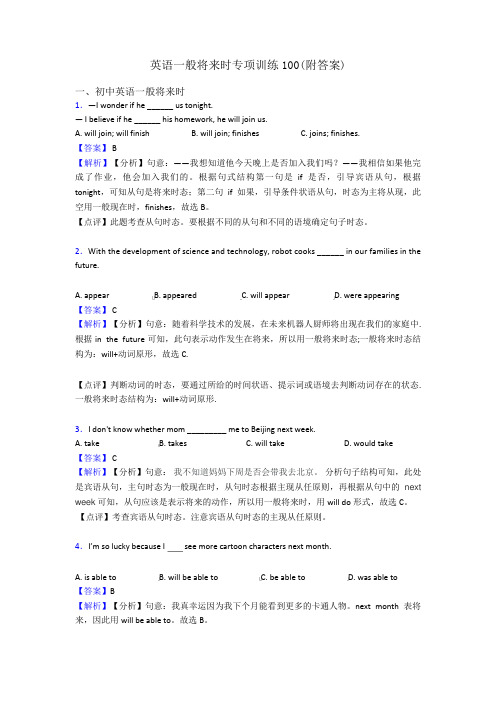
B. won't get; don't study
C. don't get; don't study
D. don't get; won't study
【答案】 B
【解析】【分析】句意:如果你不努力学习,你就不会取得好成绩。主句用一般将时,从
句用一般现在时代替。故选 B。
【点评】此题考查主从句的时态问题,平时应多归纳总结各种时态,语态和句式的结构及 用法。
C. will be ; will be
D. is ; will be
【答案】 D
【解析】【分析】句意:父亲这一周很忙。下一周他将是空闲的。this week,指现在的状
态,用一般现在时:主语+动词原形,如果主语是第三人称单数,谓语动词也变成第三人称
单数,next week.指将来的状态,用将来时态:主语+will do。故选 D。
英语一般将来时专项训练 100(附答案)
一、初中英语一般将来时
1.—I wonder if he ______ us tonight.
— I believe if he ______ his homework, he will join us.
A. will join; will finish
B. will join; finishes
【点评】考查动词的时态。
26.—How long you Liutle Women?
—I am due to return it in two weeks.
A. have;borrowed
B. will;lend
C. will;keep
【答案】 C
【解析】【分析】句意: ——你要借这本《小女人》多久?——我将在两周内归还。根据
- 1、下载文档前请自行甄别文档内容的完整性,平台不提供额外的编辑、内容补充、找答案等附加服务。
- 2、"仅部分预览"的文档,不可在线预览部分如存在完整性等问题,可反馈申请退款(可完整预览的文档不适用该条件!)。
- 3、如文档侵犯您的权益,请联系客服反馈,我们会尽快为您处理(人工客服工作时间:9:00-18:30)。
英语一般将来时测试卷(有答案)一、初中英语一般将来时1.- My aunt me to Europe for vacation next month.- Have a good time!A. takeB. tookC. will take【答案】 C【解析】【分析】句意:——我阿姨带我下个月去欧洲度假。
——玩得高兴!根据next month可知, 叙述的是在将来发生的事情, 故用一般将来时态, 故选C。
【点评】一般将来时2.— I hear your father has gone to Tokyo on business?— Yes. And he _______ in three weeks.A. has returnedB. will returnC. would returnD. returns【答案】 B【解析】【分析】句意:—我听说你父亲出差去日本了?—是的。
他将在三周后回来。
时间状语in three weeks与一般将来时连用,故选B。
3.I don't know if he _____ tomorrow. If he _____, I'll go to see him.A. leaves; gets upB. will go; will goC. will come; comesD. is arriving; leaves【答案】 C【解析】【分析】我不知道明天他是否会来。
如果他来了,我会去看他。
结合语境可知前文是宾语从句,根据时间状语可知从句中描述的是将来的动作,故用一般将来时态。
下文是条件状语从句,当主句描述将来动作时,条件状语从句中用一般现在时态表示将来的动作,故选C。
【点评】英语宾语从句的时态和主句没有必然的联系,需结合语境进行具体分析。
而英语状语从句的时态与主句有比较紧密的联系,若主句为一般将来时,时间和条件状语从句通常要用一般现在时表示将来,而不能直接使用将来时态。
4.—Have you watched the new movie Kung Fu Panda 3, Kelly?—Not yet. I________it with my classmate tonight.A. will watchB. was watchingC. have watched【答案】 A【解析】【分析】句意:---你看了新电影《功夫熊猫3》了吗,凯利?---还没有,我今天晚上和同学去看。
A是一般将来时;B是过去进行时;C是现在完成时。
由not yet可知此处动作尚未发生,可排除BC;另外tonight是将来时间,所以用一般将来时。
故答案为A。
【点评】考查动词的时态,注意上下文的暗示词。
5.I'm not sure if Lily_______ me. If I _______, I will go with you.A. will invite, will be invitedB. will invite, am invitedC. invites, will inviteD. invites, invite【答案】 B【解析】【分析】句意:我不知道他是否会邀请我,如果我被邀请,我将和你一起去。
题文出现两个从句,第一个是if引导的宾语从句,第二个是if引导的条件状语从句。
根据句意,宾语从句应用一般将来时,条件状语从句中,主句用一般将来时,从句用一般现在时。
故选B。
【点评】考查动词的时态和语态。
6.—Could you tell me_______?—In five minutes, at 10: 25.A. when did the next underground arriveB. when the next underground arrivedC. when will the next underground arriveD. when the next underground will arrive【答案】D【解析】【分析】句意:—你能告诉我下一个地铁什么时候到吗?—五分钟后,10点25分。
tell后跟宾语从句,宾语从句需用陈述句语序,A、C两项都是疑问句语序,可排除。
根据答语In five minutes,结合句意语境,可知还没有到站,需用一般将来时态,故答案选D。
【点评】考查宾语从句。
根据语境确定宾语从句的时态,注意陈述语序。
7.—Do you know ______?—The day after tomorrow.A. when we visited the museumB. when we will visit the museumC. when did we visit the museumD. when will we visit the museum【答案】 B【解析】【分析】句意:——你知道我们什么时候参过博物馆吗?——后天。
Do you know 后接宾语从句,应使用陈述结构,因此排除C和D,根据答语The day after tomorrow.可知问句使用一般将来时,故答案是B。
【点评】考查宾语从句的语序各时态,注意宾语从句使用陈述语序,根据答语确定问句的时态。
8.Hurry up. The train _________ in twenty minutes.A. leftB. has leftC. is leavingD. has been away【答案】C【解析】【分析】句意:快点。
二十分钟后火车将要离开。
根据时间状语in twenty minutes可知此处用一般将来时,表示位置移动的动词,如leave, go, come等的现在进行时表示一般将来时,故为is leaving,故答案选C。
【点评】考查短暂性的动词的进行时态表将来。
9.If it is clear tomorrow , I ________a bike to the underground station.A. rideB. will rideC. rodeD. have ridden【答案】 B【解析】【分析】句意:如果明天天气好的话,我会骑自行车去地铁站。
ride骑车,动词原形;will ride是一般将来时态;rode是ride的过去式形式;have ridden是现在完成时态。
句中if引导的是条件状语从句,从句中一般现在时态,主句应使用一般将来时态,故应选B。
【点评】考查动词的时态,以及if引导的是条件状语从句,从句中一般现在时态,主句应使用一般将来时态。
10.—I wonder if you for a picnic tomorrow.—If it ,I will go.A. go, not rainB. go, doesn't rainC. will go, isn't rain.D. will go, doesn't rain.【答案】 D【解析】【分析】句意:--我想知道明天你是否去野餐。
--如果天不下雨,我就去。
分析:第一个句子为宾语从句,主句为一般现在时,从句用原来的时态;第二个句子为条件状语从句,体现主将从现的原则,主语是第三人称单数,因此助动词用does.故选D【点评】考查动词的用法。
11.If our government ________ pay attention to the safety of food, our health ________ in danger.A. isn't; isB. doesn't; will beC. won't; isD. isn't; will be【答案】 B【解析】【分析】句意:如果我们的政府没有关注食品的安全,我们的健康将处于危险中。
If 引导的条件状语从句,用一般现在时表示一般将来时,主句用一般将来时。
第一空主语our government是第三人称单数,位于实义动词前,故此处用助动词doesn't。
故选B。
【点评】考查动词的时态,以及条件状语从句”主将从现“时态的用法。
12.Father's Day is coming. I'm thinking about ________.A. what present I gave himB. where shall we have a big mealC. how I will give him a surpriseD. if I planned a party for him【答案】 C【解析】【分析】句意:父亲节即将来临,我正在考虑怎样给他一个惊喜。
think about,考虑,后接宾语从句,宾语从句用陈述句语序,故排除B,根据 Father's Day is coming.可知正在考虑做的事情还没做,应用一般将来时,故排除AD,故选C。
【点评】考查宾语从句,注意宾语从句的语序和时态。
13.— Have you watched the new movie Jurassic World, Steven?— Not yet. I ________ it with my cousin this evening.A. will watchB. was watchingC. watchedD. have watched【答案】 A【解析】【分析】句意:——你已经看过新电影Jurassic World吗,史蒂文?——还没有,我将和我的表弟今天晚上去看。
A. will watch 一般将来时态; B. was watching过去进行时;C.watched 一般过去时;D.have watched现在完成时态。
根据否定回答,可知还没有看这个电影,所以今天晚上去看用将来时,故选A。
14.We______ to see the movie Life of Pi as soon as school is over.A. goB. wentC. will goD. was going【答案】C【解析】【分析】句意:我们一下课就将去看《少年派的奇幻漂流》这部电影。
as soon as 引导的时间状语从句用一般现在时表示将来,主句用一般将来时,故选C【点评】此考点也是中考最喜欢出现的考点,引导宾语从句时没有“主将从现”的说法。
除了as soon as外,还有when, if也一样要注意“主将从现”。
15. We some robots at home in the future, and there some in the office,too.A. will have; will haveB. have; will beC. will have; will beD. will have; are【答案】 C【解析】【分析】句意:在将来我们家里将有一些机器人并且办公室里也将会有一些。
